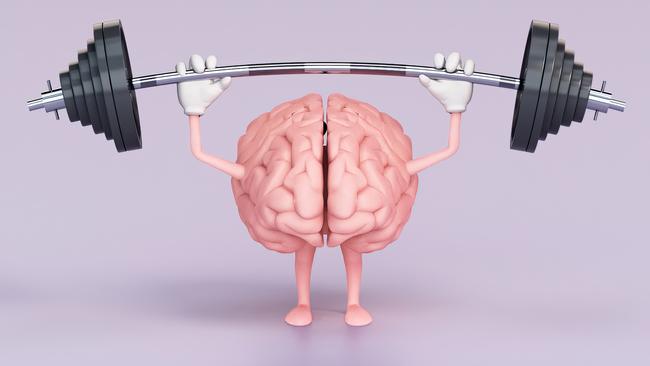Do brain training apps work? We tested four of them
Simon Usborne tried the mind-boosting games that are supposed to increase your grey matter, including Dr Kawashima’s Brain Training and Lumosity

In the gloriously quiet window between the school run and the ascent to my desk, I would ordinarily doom-scroll social media while inhaling my second coffee.
But today, instead of corroding my brain I will enrich it. An app called Peak presents me with a series of puzzles and games: some so simple my three-year-old could do them, others that induce the kind of stress I would expect to feel while piloting a broken moon lander.
In Perilous Path, landmines appear briefly in squares on a four-by-four grid. They disappear before two dots appear on other squares. I must memorise the locations of the bombs, then trace a route from one dot to the other without blowing up.
In Flight Path, little planes fly into my screen at random, each marked with a letter. I must spell a three-letter word as soon as I spot one and draw flight paths for the corresponding planes so that they land at the bottom of the screen, in order and without crashing.
As the skies get ever more crowded, I frantically draw spiral holding patterns for planes while trying to spot words such as “cow” and “sad”. Apparently the game will improve my attention, my planning skills and my ability to “task-shift” — i.e. spin plates.
Peak is one of a clutch of apps that make bold claims about improved focus, heightened memory and faster processing. If social media apps are junk food, brain-training apps market themselves as your five-a-day — and we’re hungry for them. The market is estimated to be worth $16 million and is projected to reach more than $46 million by 2028.
Of course the irony in tech companies selling phone apps as the solution to the attention problems caused by, er, apps made by tech companies is not lost on me. Still, having limped into the “over 40” bracket a couple of years ago — the demographic of initial cognitive decline — I was curious. Could they work?
“There is data to show a correlation between ageing well and playing games,” says Fernand Gobet, a cognitive scientist at the London School of Economics, who has studied the effects of brain training. “One explanation is that the games help, but another is that people who are ageing better are more likely to play the games.”
Barbara Sahakian is a professor of clinical neuropsychology at the University of Cambridge, a veteran of cognitive research and scientific adviser to Peak. Her early research looked at how virtual games could positively affect parts of the brain where deterioration is linked with dementia. “I was really interested in the idea of ‘use it or lose it’ — that if you could strengthen these connections in the brain, and keep them active, you could keep your cognition and functionality better for longer,” she says.

Sahakian has designed two games on Peak: Wizard, a memory-training game in which the player must remember and match cards carrying symbols of subtly different shapes and colours, and Decoder, where players must tap when the sequence of numbers matches the three-digit codes on screen.
In a 2019 study Sahakian led a research team that placed 75 healthy young adults in three groups. One group played no games, one played online bingo, the other played Decoder. The Decoder group, who played for eight hours during a month, then performed best in a separate test of attention and focus.
After two weeks of daily gaming using Peak, plus another app called Luminosity, and Dr Kawashima’s Brain Training, a Nintendo Switch game, I review my Peak stats. It’s gratifying to note that my “brain score” has risen steadily. Apparently I’m in the 51st percentile for people in my age group (i.e. a smidgen above average). But I’m sceptical: how much of this is because the brain games are just making me better at playing brain games?
Gobet struggles to see any convincing evidence to the contrary, although he says there may be some “linear transfer”, which is to say I might also be getting better at activities that are similar to those that the games involve. Usefulish.
Sahakian acknowledges the lack of large-scale randomised controlled trials, but says there is a link between games such as her Wizard and improvements in “psychomotor slowing”, which is when thoughts and memories seem harder to summon as we age. “Anything to do with learning that challenges us does drive neural circuitry in the brain, and keeping that active is definitely a good thing,” she adds.
Anne Corbett, a professor of dementia research at the University of Exeter, uses free brain-training games as part of the Protect study, which is investigating how the brain ages and is open to anyone aged 40 or over. She has watched with bemusement as the kind of games she’s been working with for more a decade have grown into a vast global industry. “There are lots of programs that make all sorts of claims with very limited evidence to support them,” she says. “But generally the science is good — the brain is a muscle, and like any other muscle it responds well to exercise.”
Corbett’s research has shown that people who have taken part not only get better at the games but also more important activities that can become difficult for ageing brains or those affected by dementia — such as managing finances, household chores or using public transport.
Corbett and Sahakian both say that brain training should not be a substitute for real exercise, which, among other things, promotes good blood flow to the brain. On this, scientists are in agreement.
One morning, just after that second coffee, I take this advice to what feels to me like a logical conclusion and do my daily brain games during an interval session on my indoor training bike. At first, I feel my raised pulse is improving my focus. But then, at a crucial moment in Flight Path, a droplet of sweat lands on my phone’s screen, causing a plane to crash. That day at least, I record a decline in cognitive performance.
Four brain-training apps to try now
Peak
Offers more than 45 games devised to target recall, attention span, problem-solving, mental agility, language, co-ordination and “emotion control”. A limited number of games are available free, but it’s $34.99 a year for premium access.
Lumosity
The app’s creators worked with 100 researchers in subjects ranging from genetics to chemofog (memory and concentration problems induced by chemotherapy) on more than 50 games. They aim to improve speed of thought, recollection, attention and mathematical ability. It costs $14.99 for a monthly subscription.
Dr Kawashima’s Brain Training
This game designed for Nintendo Switch is a comprehensive test for your wits. It incorporates maths exercises, spelling tests, memory games and sudoku puzzles. Wannabe Mensa members can compete in tests against other users online. The game has a one-time purchase fee of $54.
Elevate
The maker of this app claims that 90 per cent of users report improved vocabulary, maths skills and overall cognitive sharpness. With more than 40 games in total, it delivers a tailored daily program of three to five games to test your reading, writing, memory and maths skills. There’s a yearly subscription fee of up to $80.
The Times




To join the conversation, please log in. Don't have an account? Register
Join the conversation, you are commenting as Logout